For coaches who don’t check the “traditional” boxes, the NHLCA Guest Coach Program is turning opportunity into outcomes. Supported by more than 20 NHL teams, this development pathway is creating real access and mentorship, leading to jobs behind the bench for women and BIPOC coaches.
By Scott Burnside
Kim Weiss, the second-year video coach of the Colorado Eagles of the American Hockey League, was back in her old stomping grounds in the Washington, D.C. area for part of the summer, working out with some players she used to coach back in the day.
Weiss grew up in many ways on the local rinks in the area, first as a player who would ultimately go on to a stellar collegiate career at Trinity College, and then as a groundbreaking coach. On this visit, she happened to run into a guy she played mite and squirt hockey with. Go figure. They had a laugh at how their lives had gone since those long-ago days, and then her old teammate asked if Weiss would send him some Colorado Eagles swag.
It was a sweet moment that was a reminder of the path Weiss has traveled and the barriers she has helped break down en route to becoming the video coach of the Colorado Avalanche’s top farm team.
Weiss isn’t from Warroad, Minnesota, one of the great hockey towns in America. She didn’t play for Team USA internationally. But the game is nonetheless in her DNA.
“You don’t have to check those traditional boxes anymore, and you’re seeing it time and time again,” said Weiss, who is an active member of the National Hockey League Coaches’ Association’s Female Coaches Program, and a participant in the NHLCA’s innovative Guest Coach Program, where she was a guest coach with the Avalanche in 2023.
Now she’s a member of the Avs organization. Funny how things work out, no?
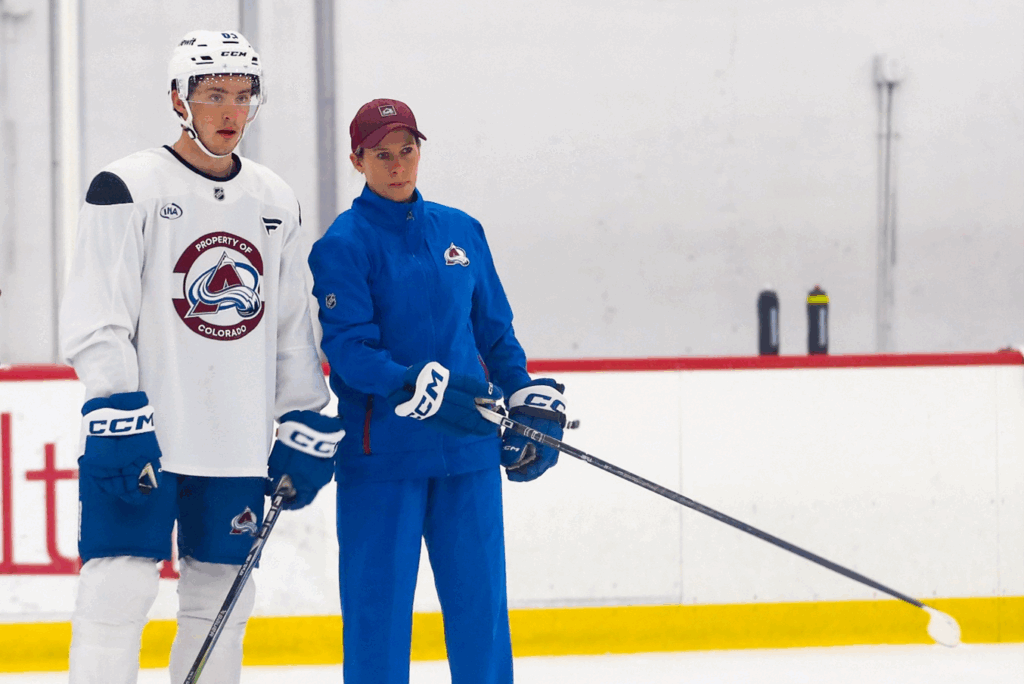
Photo: Kim Weiss (Right) at Colorado Avalanche Development Camp, July 2025 (© Colorado Eagles)
“I think that the hockey world is starting to see through people like me and through the Guest Coach Program that coaches can come from all different backgrounds and can look a lot of different ways, but you can learn the game and you can have a passion for it and a hunger for learning, and that’s going to take you pretty far,” said Weiss, whose previous coaching stops included men’s Division III hockey, the North American Hockey League (NAHL), and the AAA level in the Washington area.
Now Weiss has traded in the buses, cold pizza and burgers, and cut-rate motels of her earlier coaching career for the perks of coaching in the American Hockey League, one step below the ultimate coaching destination, the National Hockey League. Not that Weiss looks too far ahead.
“I like to just be where my feet are and I’m just coaching hockey and I don’t try to think too much about the letter acronym of the league I’m in. The players to me are players. They can be male, female, old, young. It’s just coaching hockey and it’s a game and it’s supposed to be fun,” Weiss said.
Still, she acknowledged, “it’s pretty cool that a little girl from Maryland is in the American Hockey League.”
Trust us, Weiss isn’t the only one who shares that sentiment.
A few years back, Suzanne Borchert, the Executive Director of Hockey Operations with the Colorado Avalanche, thought it would be a novel idea to develop a coaching program that would give female and BIPOC (Black, Indigenous, and People of Color) coaches an opportunity to learn from NHL staff as a way of growing the game by growing the coaching community.
But when Borchert started looking into the many moving parts of how such a program might work, well, let’s just say the road from concept to reality seemed daunting.
“I was just insanely overwhelmed,” Borchert said with a laugh.
Luckily the NHLCA, led by Executive Director Lindsay Pennal, had a similar idea and has helped dozens of women and BIPOC coaches join NHL teams for development camps and training camps, as well as various touch points throughout the NHL season to help create an ever-expanding pipeline of knowledgeable coaches throughout the coaching system.
Borchert, who has been with the Avs since 2021 and in her current role since 2022, recalled connecting with Pennal after Pennal had given a presentation to NHL GMs about the NHLCA’s plan to expand their successful remote mentoring programs that began at the start of the pandemic, to in-person opportunities for worthy coaches.
The idea dovetailed perfectly with what Borchert and Avs GM Chris MacFarland had been discussing for the Avs.
“I’ve been fortunate enough along the way during my career to meet people who are willing to teach me and help me better myself, both personally and professionally and I always try and just return the favor to anyone I can,” said Borchert, who graduated from Syracuse University before getting a law degree from William & Mary.
“So, I think that’s what really drew me to (the Guest Coach Program),” she added.
Not surprisingly, given how things have worked out with the Avs, Borchert describes Weiss as the “model” guest coach.
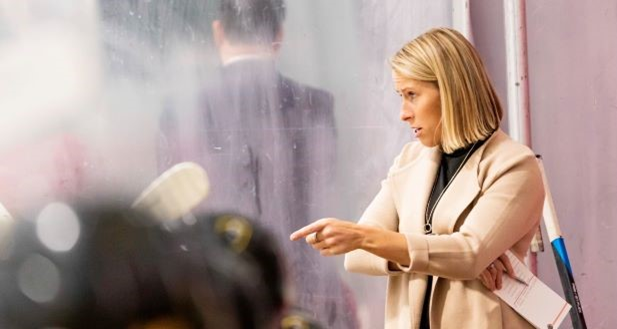
Photo: Kim Weiss (© Maryland Black Bears)
“She took advantage of every opportunity that was given to her and also created her own opportunities within our organization,” Borchert said.
“Even like before she got here, she’s just a real go-getter. And I think that it was easy when we made the decision to hire her because so much of sports and hockey in general, and this is true for any business, you have to make sure that the person you’re hiring is a good fit culturally and gets along with people, not only the other coaches and employees, but also the players. And she had those touch points,” Borchert added.
There are parallels between Borchert and Kate Madigan, the assistant General Manager of the New Jersey Devils.
Madigan didn’t grow up playing the game (although hers is a prominent hockey family). She has a master’s degree in accounting. But when the late Ray Shero was GM in New Jersey, he brought Madigan into the hockey operations world and she’s been a trailblazer ever since.
“I am the opposite of what you would consider a hockey executive. So, for me, I’m really big into diversity, but not checking the box diversity, to be clear, and inclusion, and giving opportunities when it’s deserved,” Madigan explained.
Madigan was introduced to Pennal and the NHLCA by then-Devils head coach Lindy Ruff. They discussed the NHLCA’s plan for connecting NHL teams with guest coaches, and Madigan was all aboard with the idea, as was GM Tom Fitzgerald.
“For me, it was important to get some of these coaches the opportunity to network with people in the NHL and AHL, and to learn from them. And then us learn from them as well, right?” Madigan explained.
“It was really a partnership to learn from each other. But the biggest thing for me personally was to give them the access, to have the opportunities,” she added.
The Devils are into their fourth year of hosting guest coaches. Under Madigan’s guidance, the Devils designed their version of the Guest Coach Program to have coaches come for two years.

Photo: Lindsay Berman and Leon Hayward attend the New Jersey Devils Development Camp in July 2023 (© New Jersey Devils)
The theory was that by the second year, the coaches would have lost any sense of awkwardness or nervousness, and they would get more out of the program, and the team will benefit as well from the comfort level the guest coaches will have with the NHL environment.
That is how Tara Watchorn, a former Olympian and now the head coach of Boston University’s women’s team, and Venla Hovi, a top Finnish player who is now the assistant coach of Harvard’s women’s team, have come to be with the Devils for the past two seasons, the experiences building one from the other.
Hovi was very pregnant with her son, now 10 months old, during last year’s development camp, so she didn’t have the opportunity to get on the ice with the Devils’ prospects, but it didn’t lessen her enthusiasm for the experience nor her stockpiling of information and ideas.
“Obviously, I live to learn like that’s how I see anything in life like that. That’s what drives me,” Hovi said. “So, obviously, as an opportunity to learn, I was really excited and found it extremely valuable.”
Hovi has literally page after page of notes she made during her time with the Devils.
“The list is so long,” Hovi said with a laugh.
“My number one thing is I find my strength planning good practices and I’m sort of a practice nerd in terms of wanting things to be as perfect as possible. And I would say that’s the number one thing I really watch closely (with the Devils), how they plan practices. How do they divide the D and the forwards? How many people are on the ice? Obviously learning new drills. I learned a lot about communication, presentations, how are people presenting? How long are meetings? Watching the guys listening to a meeting, are they engaged? Is this something that I would want to try when running a presentation?” Hovi explained.
And then there were the relationships forged over the course of her involvement, still ongoing, with the team.
At one point Hovi found herself in New Jersey head coach Sheldon Keefe’s office for a 30-minute chat about coaching.
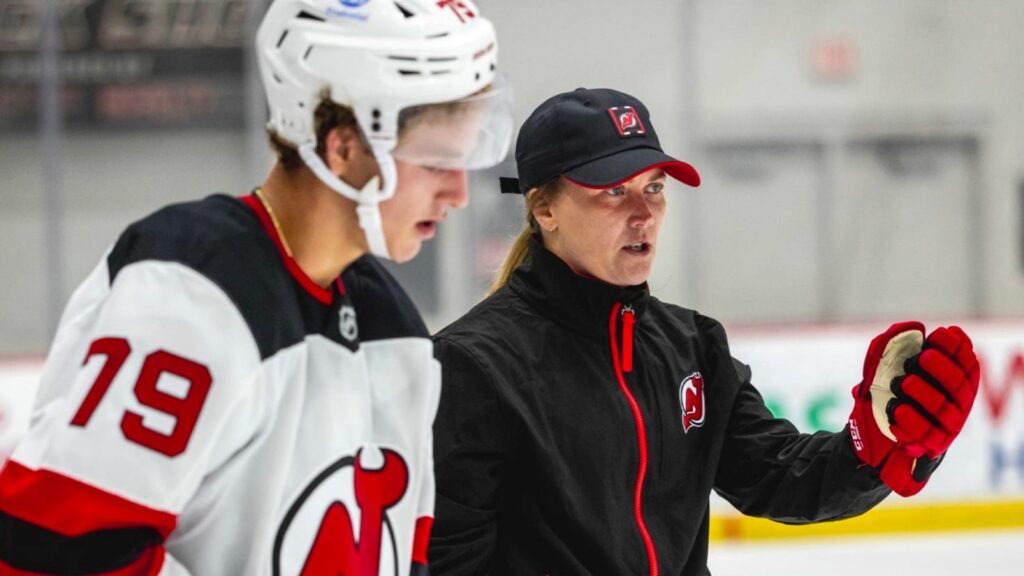
Photo: Venla Hovi attends New Jersey Devils Development Camp in July 2025 (© New Jersey Devils)
Who knows where this leads Hovi. But among the many possibilities that may grow out of the NHLCA and their mentorship programs like the Guest Coach Program is the potential impact on the game globally. Perhaps Hovi uses some of this knowledge she continues to accrue in North America to help the game grow in Finland.
“That’s where I grew up. The person I am is pretty tied into that culture and the people and the hockey there. I think Finland has a long way to go in terms of being in the same position where I would say like US and Canada are in terms of educating female coaches, providing them opportunities, valuing their experiences, the adversity they had to fight through throughout their careers. I would claim that’s still not there,” Hovi said.
So, if she got a chance to help rewrite that coaching narrative in Finland given her experiences with the NHLCA and during her other coaching stops, well, that would be something pretty special.
More than 20 NHL teams have taken part since the Guest Coach Program started in 2021, giving 47 coaches unprecedented opportunities to learn from the best in the game.
Each program is a little different, but there are touchpoints for all the guest coaches throughout the season, beginning with development camp after the NHL Draft, which puts the guest coaches in contact with development staff and minor pro coaches and scouts. If schedules allow, there’s a training camp visit that puts them in close contact with the NHL coaching staff, and then periodic visits and/or calls throughout the season.
The Devils have invited their guest coaches on a call with the development staff during the season to talk about the prospects, many of whom they would have met during development camp. Guest coaches have also been given access to pro scouting meetings during the season.
“Again, it’s a little bit different. But it’s hockey, right? And it’s for them to see the process,” Madigan explained.
This year, when the Devils are in Boston, where both Watchorn and Hovi are based, there will be opportunities for them to come and hang out with the Devils and their coaching staff on off days or game days.
The Devils “have been so amazing working with me and just staying in touch and being able to soak in as much as I can. And it’s been really cool. And even just starting year two, to be a little bit more familiar with everyone around the organization. You really just feel like you’re stepping into a comfortable space and able to soak it all in,” said Watchorn, who won an Olympic gold medal with Team Canada in Sochi in 2014 and is the first Boston University player to return as head coach of the high-profile program.
“And it’s been very humbling, just trying to soak it all in,” Watchorn added. “I’m really appreciative for that opportunity.”
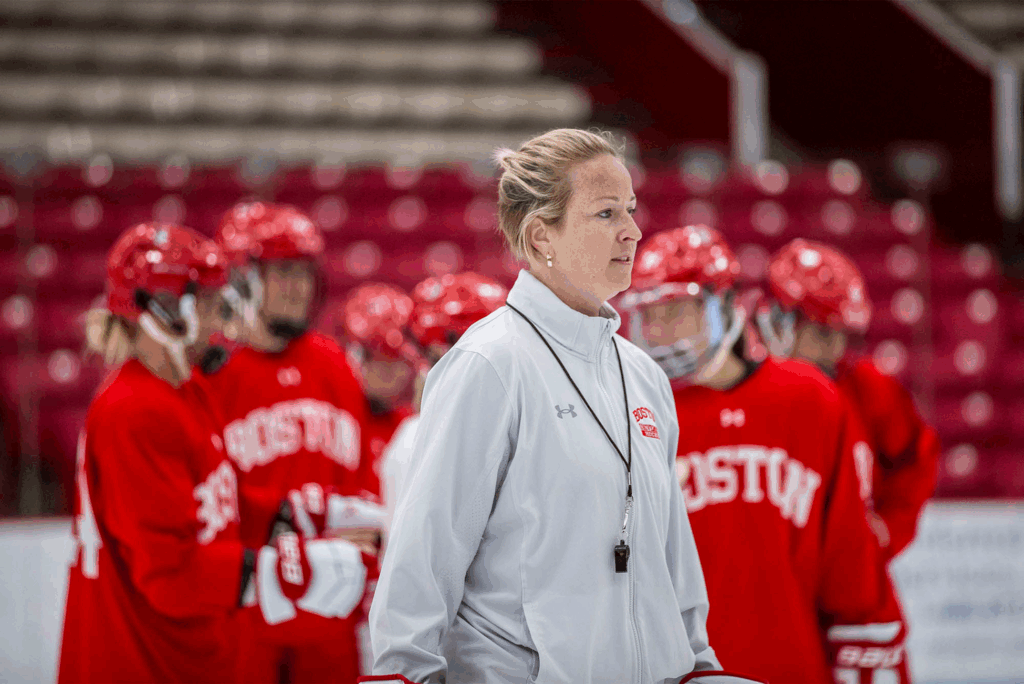
Photo: Tara Watchorn (© Boston University)
Derrick Henderson was getting ready to speak at a coaches’ clinic in Ann Arbor, Michigan, when he got word from the Colorado Avalanche that he’d been invited to interview for the Guest Coach Program for the 2025-26 season.
The Columbus resident is an assistant coach with the Columbus Mavericks of the Premier division in the USPHL and, as a favor to a friend, last year Henderson took on a role with the Columbus Academy Vikings as their varsity head coach.
A native of Pennsylvania, north of Philadelphia, Henderson came by the game via a circuitous route. He played street hockey goalie as a youth. He then attended Bowling Green State University and, before his freshman year, graduated to playing goalie on ice.
“My equipment was a mess. I didn’t know what I was doing,” Henderson recalled with a laugh.
He was studying sports management and spending so much time at the rink, he ended up helping out the equipment manager for Bowling Green’s prominent D-1 men’s hockey team. That led to more time on the ice, and during home weekends Henderson would skate with the big team taking shots while the varsity goalies prepared for the games. Seeing the ragtag gear Henderson was sporting, the varsity goalies outfitted him with their old junior gear.
His coaching career began in Arizona, where he moved after graduation, and Henderson found himself working with roller hockey goalies. A stint with the women’s team at Bowling Green led to a long stretch working with youth hockey teams in Columbus, where Henderson has called home for the past 15 years.
Over the years Henderson found himself giving that almost imperceptible nod to other Black coaches he encountered along the way, a kind of ‘yes, I see you and we’re in this together’ kind of moment.
One weekend, he ran into Derek Arledge, who told Henderson about the NHLCA and their BIPOC Coaches Program. That led to another conversation with another BIPOC Coaches Program member, Paul-Arthur Plaisir, who got a chance to be a guest coach with the Boston Bruins.
“We talk about it all the time, what an opportunity this is,” Henderson said.
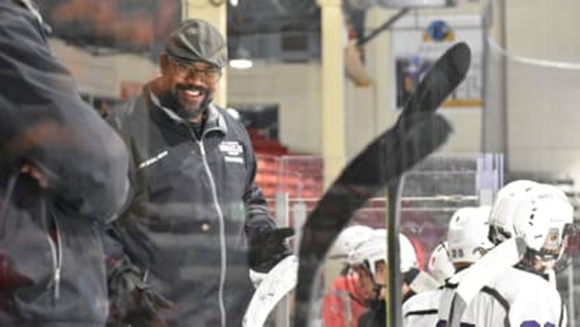
Photo: Derrick Henderson
Henderson admitted he was “freaking out” a bit about the Colorado invitation and, in one of those serendipitous moments, one of the people Henderson reached out to for advice was Kim Weiss, whom he’d met at a conference. Needless to say, Henderson paid close attention to what Weiss had to say.
Given Henderson’s strong background in analytics and video coaching, Borchert felt that might be a good way for Henderson to get the most out of his experience at development camp. So, while Henderson wasn’t on the ice, he threw himself into taking advantage of the different vantage point he had through his meetings with the video and analytics staff with the Avs.
He spoke at length with the Avs’ top analytics guy, David Wood. He watched on-ice workouts with the team’s scouts and development coaches, including Avs legend Milan Hejduk and Joe Sakic, the Hall of Fame Av who is now the President of Hockey Operations. Henderson discovered, quite by accident, that head college scout and amateur scout Mike Battaglia was coaching high school hockey in Columbus when Henderson was just getting involved with youth hockey in Columbus.
“I’m talking to everybody,” Henderson said. “Just watching and learning and listening and chatting.”
This program doesn’t work without teams like the Avs, and conversely without people like Henderson.
The NHL teams commit to the process and there is an expenditure of time and money, but the team’s willingness to open its doors to strangers has to be met halfway by the willingness of the guest coaches to step up and embrace everything around them.
“It was a phenomenal opportunity just to be there,” Henderson added. “Who knows where I’m going to use this information later.”
“You’re like, ‘oh my God, I’m in Denver, I’m wearing Colorado Avalanche gear. What’s going on? This is amazing. What possibilities does this open up?”
“I’m an evangelist for this program,” Henderson said.
——
Scott Burnside is an award-winning journalist who received the Elmer Ferguson Award from the Hockey Hall of Fame in 2024. He’s covered the NHL and international hockey for over 35 years.
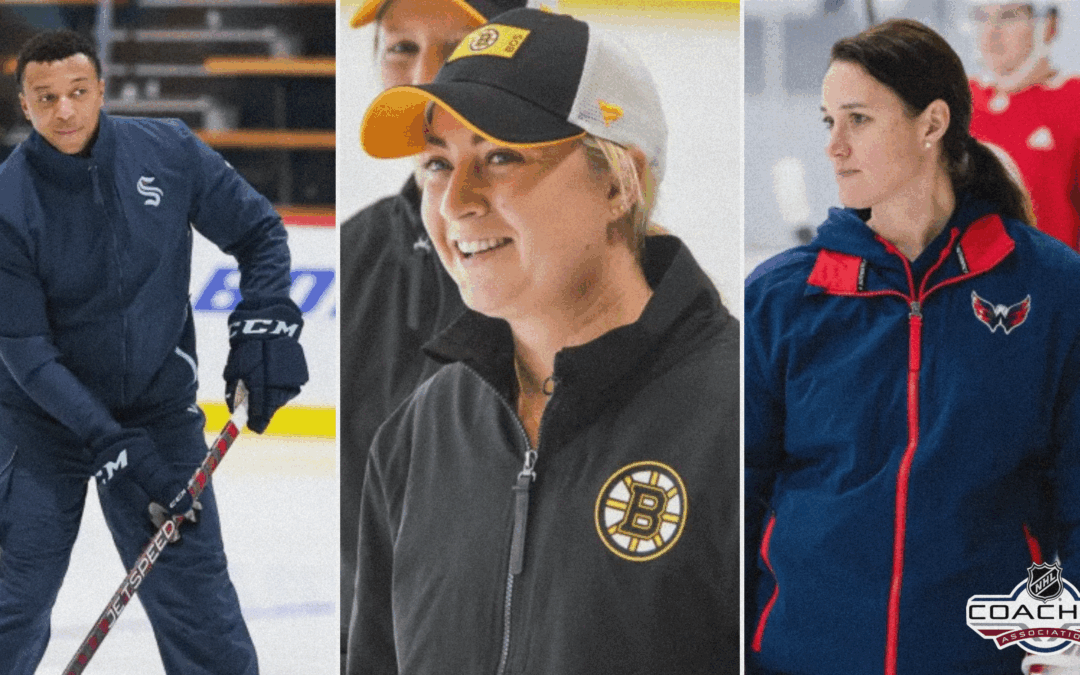
Recent Comments